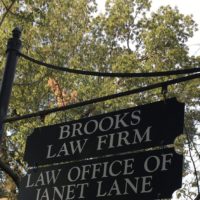Criminal Trespass Lawyers of Tennessee
Most people know that trespassing involves going onto someone else’s property. While a landowner may file suit against a person for trespassing, in criminal trespassing cases the state is charging an individual with a crime. The seriousness of a trespassing charge depends on the circumstances. For example, while simply being on someone’s property without their consent is a Class C misdemeanor, certain facts about the case might raise the crime to a Class A misdemeanor. This results in stiffer fines and sentencing. What many people do not realize is that criminal trespassing is usually one charge of several, and may allow law enforcement greater power to search or detain persons. In these situations, sometimes defeating the criminal trespass charge may void the other charges.
For these reasons, if you or someone you know is charged with criminal trespass you should immediately seek the counsel of a qualified criminal defense lawyer. Brooks Law Firm has experienced attorneys familiar with the ends and outs of trespassing laws in Tennessee. We will do our best to examine your case, get your side of the story heard, and help you to make the right decisions. You do not have to plead guilty, as it may be possible to reduce the charges or get your case dismissed completely. Below is a brief overview of three kinds of criminal trespass in Tennessee:
We offer free a consultation of your criminal case with one of our experienced attorneys
Criminal Trespass, TCA 39-14-405: Simply put, a person criminally trespasses if they enter or remain on property without the consent of the owner. Trespass cases often hinge on consent. Since consent does not have to be explicit, an experienced attorney can help you determine whether consent was implied, legally speaking. This can make the difference in lawful activity and criminal activity. Criminal trespass is a Class C misdemeanor.
One can be found to enter property in a variety of methods. Obviously, walking onto someone’s property is the easiest example, but one could also remain on property after it closes, for example. A more colorful example might be protests, such as when people chain themselves to gates, or block entrances to premises in a parking lot. It can be enough just that an arm or leg enters the property to sustain a charge of criminal trespass. More recently, unmanned aircraft such as drones have been the subject of criminal trespass charges.
Aggravated Criminal Trespass, TCA 39-14-406: The facts of a case can increase a criminal trespass charge to aggravated criminal trespass if certain factors are present. Aggravated criminal trespass can be a Class B or Class A misdemeanor, depending on the facts. A person commits aggravated criminal trespass when they:
- Know they do not have the owner’s consent;
- know, or is reckless about whether they will cause fear to another on the property;
- Cut or remove a barriers on the property in order to gain entry;
- Enter a construction site or utility company; or
- Enter the property of a railroad with the intent to:
- harm the property; or
- harm another person, or know that their presence will harm another person.
Aggravated criminal trespass is usually a Class B misdemeanor. However, if the conduct mentioned above was committed in a home, hospital, railroad, construction site, or a school, it will usually be considered a Class A misdemeanor.
Motor Vehicle Trespass, TCA 39-14-407: Any person who operates a motor vehicle on privately owned property after the person has been requested to leave the property commits a motor vehicle trespass. In addition to cars and trucks, recreational vehicles, motorcycles, mopeds, and go-carts can all be considered a motor vehicle, legally speaking. Basically, trespassing with any vehicle powered by motor could come under this statute. Motor vehicle trespass is a Class C misdemeanor with no jail time.
Defenses: While defenses to the charge of criminal trespass exist, you will want to discuss their potential for success with an experienced attorney. Generally, it is a defense that the accused reasonably believed they had the consent of the owner to be on the property. This only works if the accused did not interfere with the owner’s use of the property, and they left immediately after being asked to do so. Also, it may be possible that you were in a position where the trespass was permitted, such as in an emergency. Because defenses rely on factors which can be too complicated to explain here, it is important that you seek the representation of an experienced attorney.
Protect Your Rights, as Well as Your Record with Brooks Law Firm
Brooks Law Firm offers free initial consultations. Our attorneys understand how everyday situations can lead to trespassing charges. You may have been in the wrong place at the wrong time, or perhaps there was a misunderstanding. Whether you think you are innocent or guilty, you should seek the advice of a qualified attorney who can listen to your story and explain your options so that you can take control of your case. Brooks Law Firm will work to find out whether defenses may apply. Was there really a lack of consent to your presence? Were proper signs placed in the manner required by the law? Did you have a legally defensible reason to be on the property? We have asked these questions before, and we will work hard pay attention to every detail to get the best possible results.
Criminal trespass charges go hand in hand with other charges. Sometimes the related charges and evidence obtained are dependent on the trespass charge. This means that if the trespass charge is defeated, you might be entitled to suppressing evidence obtained at the scene, or dismissal of the entire case. This is why it is important that you speak with an experienced attorney capable of representing your side of the story. Misdemeanors are generally considered lower level crimes, but the effects should not be considered lightly. In addition to the potential for jail time and fines, misdemeanors can go on your permanent record and will show up on background checks. Employers may see your criminal trespassing charge and misjudge your character. Not only that, but the potential for jail time could affect your employment or interrupt your family life. You do not have to plead guilty. However, prosecutors can be very aggressive in presenting their case against you. A qualified criminal defense lawyer will see whether prosecutors have proven their case, find out whether any defenses apply, and negotiate for the best solution, including the dismissal of all charges when possible.
Brooks Law Firm will navigate the legal process alongside you so that you can make the right decisions in your case. Please call for a free consultation today.

